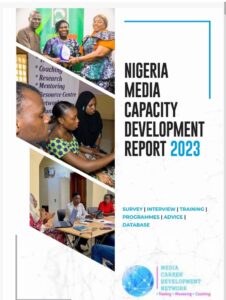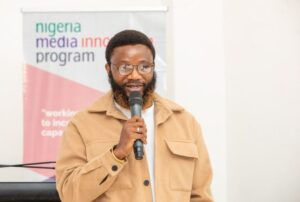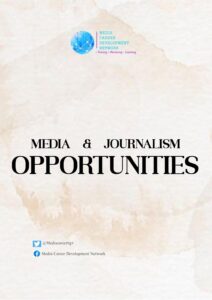Blessing Oladunjoye and Kemi Okunade report on the various issues discussed at the African Women in the Media Conference held July 21-22 in Ibadan, Oyo State.
Get education wherever you can get it, Eugenia Abu urges women journalists
Former Executive Director Programmes at the Nigerian Television Authority and Creative Director, Essential Communications, Eugenia Abu has urged women in the media to be versatile in their field of coverage to remain relevant.
Abu gave the advice while speaking on Women in Media Leadership at the second edition of the African Women in Media with the theme ‘Visibility’ held at the University of Ibadan Conference Center, Ibadan.
Abu who noted that education is not restricted to the walls of a school urged women to get education wherever they can so they are limited or denied when opportunities are available.
Abu who said she was not promoted until after 28 years in service admonished women to be prepared for leadership, so they can survive when the opportunity comes.
In her Keynote speech, HOD Mass Communication at the University of Lagos, Prof Abigail Ogwezzy decried the rate at which women in media are not promoted like their male counterparts because of reasons hinged on her sexuality and role as a wife and mother.
Ogwezzy said women should be recognized like their male colleagues once they put the same effort in their work.
She named some women who have carved a niche for themselves in the industry and stressed that other women can do the same by breaking the stereotypes and create visibility for themselves in the industry.
On his part, Prof. Ayobami Ojebode, HOD, Communications and Language Arts at the University of Ibadan while speaking on Gender, security and election coverage highlighted the challenges women face in politics which he said include the African political structure and insecurity; financial, emotional and physical.
According to Ojebode the way to boost women’s participation in politics would be advocacies for quota system, with specific power to women, at the national assembly and a rethink of the justice system.
He noted that political issues relating to women are underreported and called on the National University Commission to mandate all journalism schools to train intending journalists on gender balance reporting.
The conference had earlier featured flash talks by women from various media organizations who inspired the participants on reporting for women in a digitalized world.
Those who gave the talks were; Hannah Ojo of the Nation Newspaper; Dr Yemisi Akinbobola, convener of the African Women in Media Conference; Stephanie Busari of CNN and Aderonke Bello, Online Editor of The Sun Newspaper.
Ojo charged women to have a rethink about their journalism practice noting that “It is not true journalism if it is not attracting social change”
Fictional writers urged to portray women positively
Fictional writers have been urged to always portray women in a positive light because people form opinion based on what they read.
The admonition was given by speakers on “Fictional Content and Perceptions of Women in Leadership” at the second edition of African Women in Media.
One of the speakers, Hadiza El-Rufai, first lady of Kaduna State, writer and founder of Yasmin El-Rufai Foundation, said writers should always portray women as warriors and not mediocre as it is presently.
El-Rufai who said that writers are ascribing gender roles to women through their writings, noted that there should be characters of men who are domesticated to create a gender balance fictional writings.
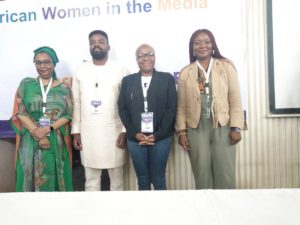
Lola Shoneyin Author and Poet urged writers to write about society where women can make choices as opposed to where women are oppressed and victimized.
She said women should revisit the way they raise their male children, adding that “we need to rethink the way we talk about women especially to our children, it is not enough to tell our sons not to beat women, we need to explain how to respect women and their opinions.”
Nollywood actor and film maker, Kunle Afolayan who said most of his works have been about promoting women explained that stories about women are not necessarily to portray them in a negative light but to address the situations in the society.
He noted that despite an approach to be more female centric in fictional stories, every filmmaker is particular about making profit.
While giving her keynote speech, CNN reporter, Nima Elbagir urged journalists to sustain the momentum when working on investigative reporting so that change can be achieved through their reportage.
In her closing remarks, Convener of the African Women in Media Dr. Yemisi Akinbobola announced the African Women Festival 2019 to hold in Kenya
AWIM18: Conference calls for Women Visibility in the Media
The African Women in the Media Conference has called for more women visibility and visibility of the invisibles in the media.
The call was made during the just concluded 2-day African conference held in the University of Ibadan, which had in attendance the First Lady of Kaduna State, Mrs El Rufia, Kunle Afolayan, Lola Shoneyin, Aderonke Bello, Eugenia Abu, Ashanti Mwilu, Ijeoma Onyeator, Funky Osae-brown, Funke Treasure Durodola, and other top media professionals.
Participants at the conference also demanded for more women working in the media and more women in media leadership.
“Only one in three journalists are women and only 15 percent gets to board management level.”
The conference urged women to produce more gender sensitive materials, writing African women back into the stories and the need to specialize.
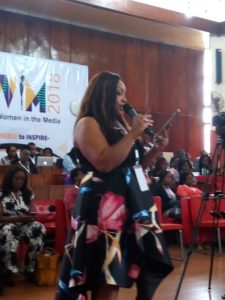
It was noted that there is need to change the narratives of women from they are not qualified enough, attention seeking, difficult to work with to positive stories of women.
Women journalists were also advised to cover hard news as against only covering soft news of entertainment, fashion and styles.
Women in the media have influence in the stories they write. How they write and phrase them tell women stories. Social media narratives need to grow beyond the slay queens to a Metoo movement.
AWIM18: Panel demands for change in women narratives
The Fictional Content and Perception of women in leadership panel at the just concluded African women in the Media conference has demanded for change in the narratives of women.
The panel aimed at having more women-based stories had the First Lady of Kaduna State, Mrs Hadiza El-Rufia who said there’s need to have more male characters in domestic position as girls are influenced by what they read as fictions.
Lola Shoneyin, the Director of Arts and Book Festival said women are more perceptive because they spend most of the time keeping quiet.
She said there is need to write about communities where women have the opportunities to be who they want to be.
“A minute a woman is different, the quickest name they call her is a harlot. How you act is ascribed to what is happening between your thighs. It’s really about keeping women down. Attacking the sum total of what you think as a woman. Whatever you are or have achieved has a way to do with sexuality and people take that signal early,” Shoneyin stated.
According to Shoneyin “ you are not meant to serve your culture, your culture is meant to serve you and culture is about identity.”
“Patriarchy dictates how women see themselves. It is all about becoming a domestic appendage. The truth is everybody is seeking acceptance but our society. And the acceptance is given by men.”
Kunle Afolayan, Nigerian actor and film maker discussed the need to balance the narratives. He said women drive things and predominantly the content of narratives.
“Whatever you do, brand yourself and be distinct.”
Ijeoma Onyeator: End female stereotype in the media
Channels Television broadcaster, Ijeoma Onyeator has called for an end in female stereotypes in the media at the just concluded African Women in the Media conference.
She stated that most content in the media are gendered and in favour of men than women and there’s need to strike a balance.
“The issue is not what the media says and how they say it, the issue is what they do not say.”
Onyeator said that there are few women participating in politics as only five percent were given a voice in the last election and most positions held by women are appointments.
“Women are under-represented in the media. There’s a male dominance and we need to re-strategise. Perception is relative, if we don’t talk about women, no one would. We should continually project women, people form perceptions from the media.”
She said men in politics should be taken on by issues affecting women and giving political assumptions about women should stop.
Data journalism is the new oil of journalism
Data journalism has been described as the new oil of journalism.
According to the Code for Nigeria team at the conference, Data journalism is a form of investigate journalism but in a more statistical way and would assist journalists in phrasing the “Why” questions.
Women journalists were urged to take more interest in data journalism which is new form of story-telling.

